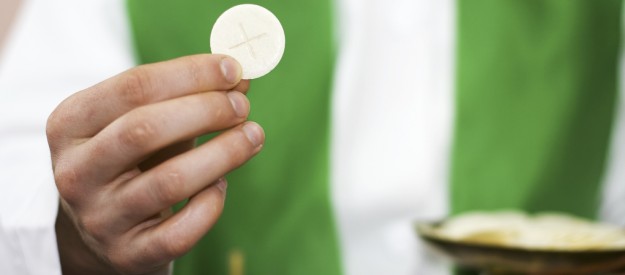"We are losing our attitude of wonder, of contemplation, of listening to creation and thus we no longer manage to interpret within it what Benedict XVI calls 'the rhythm of the love-story between God and man.'"
+ Pope Francis
Francis's Corpus Christi homily: hungers that destory, hungers that save

When Pope Francis led the Diocese of Rome in its June 19 observance of Corpus Christi—which, for Italy, is on the Thursday following the Feast of the Holy Trinity—he gave a homily that should have offered special insights for Catholic ecologists.
Cindy Wooden of Catholic New Service provides a helpful study of the Holy Father’s homily. In her report we read this:
The first reading at the Mass, from the eighth chapter Deuteronomy, recounted how God fed the Israelites with manna in the desert after freeing them from slavery in Egypt. Pope Francis said that as they journeyed in the desert, the Israelites "ran the risk of forgetting the sad events of the past, which were overcome thanks to God's intervention and his infinite goodness."
Some of the people, the pope said, were whining about missing the "the meat and onions they ate in Egypt, but forgetting that they ate those meals at the slaves' table."
Moses urged the people to remember what God had done for them and recognize again "the experience of total dependence on God," the pope said.
Catholics today also need to recognize that "some people nourish themselves with money, others with success and vanity, others with power and pride," the pope said. While such things may appear "more satisfying," the people tempted by them forget "those are meals eaten at the slaves' table."
"Each one of us can ask ourselves: Where do I want to eat? Where do I want nourishment? At the Lord's table? Or do I dream of eating tasty food in slavery?" the pope asked.
Catholics need to be attentive, remember all God has done for them -- "this is our task," he said, and "recognize the false bread that deceives and corrupts because it is the fruit of selfishness, self-sufficiency and sin."
Pope Francis asked those participating in the Corpus Christi procession to pray to Jesus present in the Eucharist: "Jesus, defend us from the temptation of worldly food that makes us slaves -- it is poison -- purify our memory," and help each person to recognize the bread of life in the "memorial of your gesture of redeeming love."
Even without specifically mentioning ecological protection, Pope Francis highlighted the cause of so much environmental damage. Man’s destructive appetites are what they are thanks in large part to a combination of sin and evolutionary holdovers.
The former corrupt our desire for what is good and holy. In doing so they inflame desires that we once needed (and in some ways, still do) to survive and reproduce but that can now be somewhat problematic. Such evolutionary hungers include the often insatiable desire to find pleasures in the means of reproduction, of the consumption of food, and of satisfying ourselves with tribal position and power. (The pope’s admonition against organized crime is a reminder that disciples of Christ are to put behind us the need to dominate and to steal our neighbors goods and wellbeing.)
And so, questions that ecologists must ask ourselves, and ask of others, include: What are our motivations? What hungers do we allow to control us? Must we satiate all hungers merely because it is pleasurable to do so? Is it really possible to ever satisfy our worldly desires, or will we continue to consume until we use up the very worldly resources that bring pleasure? Are not our worldly hungers shadows of our true hunger, to rest within the love of God? And how do we bring these questions to others—to all humanity—and bring also the antidote to our disordered and dangerous hungers?
Here I’ll point back to my earlier post on seven spiritual ways to protect the plant. You’ll note that most of them have to do with the Eucharist—our true food—the Lamb of God, who alone takes away the sins of the world.


















